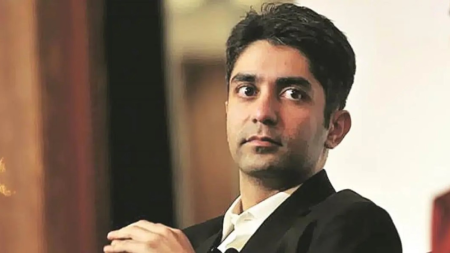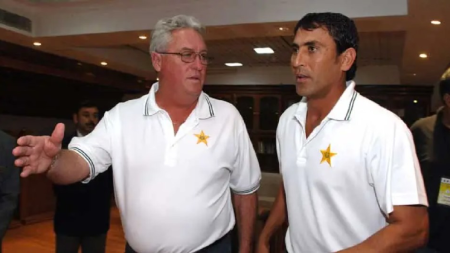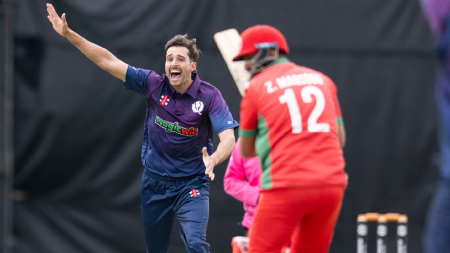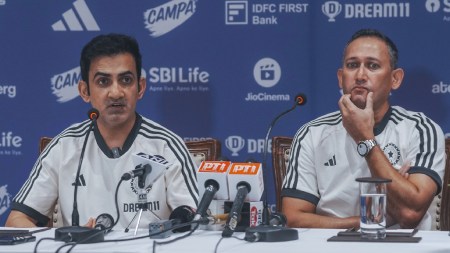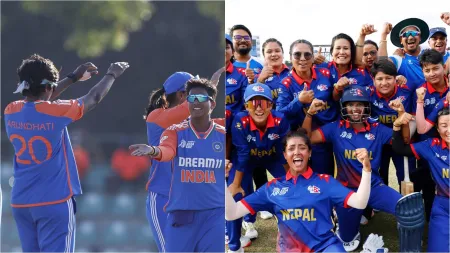Manika Batra’s secret to potential Olympic success: a fat motivational book, a surprise twiddle switch of racquet, and a mother’s emotional support
Manika Batra can’t readily remember the name of that motivational book she reads before every TT match. “Ek moti-si kitaab hai“, she describes the 280 pager which works for her like a charm. A fat book.
Effortlessly glamorous and effortfully guarded about her life, India’s most recognised table tennis star, isn’t at pains to sound particularly profound before the Paris Olympics. Her practical mantra of two decades is: “I know my dreams. So I wake up everyday and work hard for them.”

In a playing career of 15 years, she has found herself in myriad controversies of selection and copy-paste tweets and was even disallowed personal coaching at the last Olympics. Copping nastiness that comes the way of India’s female athletes, while being serially misunderstood, the 2018 Commonwealth Games champion refuses to dwell on all the bile.
She once refused to tank a match which would’ve helped one more Indian qualify, and has been labelled selfish, for not helping the team. But heading into Paris at 29, she has finally found a group of teammates and a coaching arrangement she’s comfortable with. “I don’t focus on criticism. I’m not active on social media. I don’t scroll (timelines),” she says. Some call it being insular, but Manika is simply wary of opening up.
At the table, things have been upbeat as she snicked a win over Chinese Wang Manyu, closely behind teammates Ayhika Mukherjee and Sreeja Akula who notched Top 3 scalps. “There’s no specific reason why India is doing well. We are all working very hard and the fear of facing Chinese players has gone down a little. There’s belief we can beat any opponent,” she adds.
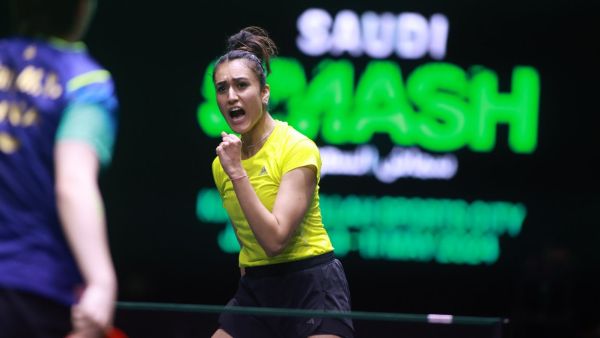 Manika Batra in action. (World Table Tennis)
Manika Batra in action. (World Table Tennis)
A Delhi girl through and through, Manika followed her older sister and brother into the sport, inheriting her parents’ tall frames – mother Sushma is 5’6 1/2″ and her father 5’11”. Sushma started off as a housewife, and then ran a fashion boutique for some years. “People asked me why’s she wasting her time in sport 15 years ago when most pushed their kids into becoming doctors or CAs. But i always thought sport had potential,” Sushma recalls. “I knew kar jaaegi woh kuchh table tennis mein. (She will go far in sport). In school I loved playing badminton in our sports period, but couldn’t do anything with it. Now, I’m living my dream through my daughter,” she adds. Manika’s older siblings would drift into careers in finance and ease Sushma’s workload, but the youngest hung around climbing unscaled heights.
There were hurdles with a family in flux and a burgeoning sporting career stressing their finances, though Sushma’s in-laws offered complete support in a bustling Punjabi household. “There were hurdles, and I was often confused whether to continue her TT or not. But she was stubborn. There were rough days as we struggled for equipment and travel. The sport had no profile really a decade ago, so some days were very difficult. But now that things are going good, I actively want to forget about the bad times,” the mother insists.
As the youngest, Manika grew up pampered by everyone, but the mother knew things were turning serious with TT when the youngster grew a streak of discipline. “I told her strictly that work cannot be timepass, and you have to respect whatever you pick as profession. And she was taught to stay positive in any situation, which helps her when there’s challenges beyond the table. We are Punjabis, we don’t get daunted by life’s ups and downs. She learnt to let go of the negative and have a 100 percent nature, no half hearted things,” Sushma insists.
Sushma reckoned very early that losses could push an otherwise bubbly daughter into a shell. “She is chatty at home. But would take losses very badly early on. I had to soften the blow of defeats for her. So I’d tell her just like you feel giddy and happy when you win, your opponents also should experience that joy. So it’s OK if you let them win a few times,” the mother recalls of going easy on a hard-on-herself child.
In the last decade, Manika turned into a massive Virat Kohli fan, for his very relatable Delhi persona. “It’s because of how he handles everything that happens to him, and how passionate he’s about winning through all that. And how he enjoys playing cricket,” Manika says.
For a boisterous Punjabi who would impulsively break into a dance listening to whatever percussions floated into her ears and flit from one distraction to next, the toiling repetitions for elite sport, needed effort in mastering. This last year was about thrashing out her erstwhile weakness: the forehand.
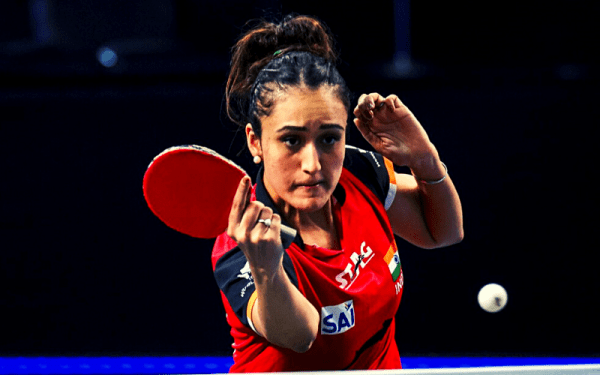 India’s top table tennis player Manika Batra used the long pimpled rubber to finish on the podium at the Commonwealth Games six years ago. (PHOTO: WTC Star Contender)
India’s top table tennis player Manika Batra used the long pimpled rubber to finish on the podium at the Commonwealth Games six years ago. (PHOTO: WTC Star Contender)
She had stagnated through the pandemic years, ending in a torrid 2022 CWG, four years after being anointed Indian TT’s golden girl . “My mind used to struggle with working on just one thing. Just repeating the same thing for 7-8 hours put strain on my head. It’s why I started on breathing exercises,” she says.
The exuberance and impulsive instincts had to be tempered in more ways than one. “I used to like Chhole bhature so much. I’m a Punjabi, we love food. And had a sweet tooth too. But as TT became a priority, I stopped liking sweet automatically. I don’t feel like eating it only, so now it’s more of salads,” she says.
Sushma witnessed Manika cut back to bland protein and fibre. “Paneer bhurji, Daal maakhni, poha, daliya, she likes that, but wanting to win means we talk about food more than her actually eating it,” Sushma laughs.
The mother rode the roller-coaster of results, but bit back the emotional advice after a loss. “My life is tied in with her TT. Especially when she’s finishing matches, my hands start to tremor and heartbeat increases. But I refuse to close my eyes, I have to watch even if I start blabbering nonsense,” she says.
Manika herself is relishing the uptick in results now, and turned very emotional after beating top Chinese Wang Manyu at Saudi SMAASH last month. She had trailed 8-10 at a crucial juncture, but executed a surprise twiddle switch of the paddle that she’d worked on endlessly, to stun the opponent. “I knew the Chinese was going to turn, and just didn’t expect me to twiddle. Honestly, it was very impressive to watch, and I was really really good. I saw the clips 5-6 times and the whole match on my flight back,” she says punch pleased. The loss cost the fancied Manyu an individual spot selection in the Chinese team, and Manika won’t be ignored as a threat at the Olympics, though India’s barely ever sniffed medal stages there.
Manika’s learnt to enjoy what she likes in her private world. Diljit Dosanjh music. Shopping for clothes. “I always think I have too few clothes in my cupboard. So sometimes shopping jaake paise udaake aa jaati hoo (blow some money),” she says candidly.
Her vocation dictates her movie tastes, with Iqbal and Chak de! as favourites. “I only like sports movies, I think. I really like Ranveer – Alia pairing but usually nothing about what’s going on screen in a movie or what the story or dialogues are, registers in my head these days. I just like watching the actors,” she says about glazing over most films.
It’s not too different with books, as words float past even if she reads them aloud. Not only is she not judging books by their covers – she barely recalls their names, focusing only on passages that put her in the right frame of mind before a match. The fat book might be called Champions Mind, she might’ve unwittingly stumbled upon what sports snobs call a player’s ‘zone’.
Disclaimer: The copyright of this article belongs to the original author. Reposting this article is solely for the purpose of information dissemination and does not constitute any investment advice. If there is any infringement, please contact us immediately. We will make corrections or deletions as necessary. Thank you.
